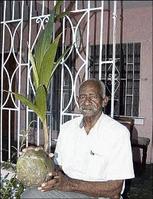Glenis Rose, JIS Writer
Curniff 'Bamboo' McGregor as he sits on the verandah of his home and tells history. - Contributed
"Historically, the sugar industry has made a significant contribution to the economy, but it also forms an integral part of the social fabric of the society and a lifeline for several communities across the country."
Even in his retirement and after approximately 65 years in the industry, Curniff 'Bamboo' McGregor remains passionate about his experience as a dedicated and committed sugar worker.
The cultivation of sugar cane, which took root in Jamaica during the early 16th century was most prevalent in the southern parishes of Westmoreland, Clarendon and St Catherine, known as the 'sugar belt'.
The sustainability and vibrancy of this vital industry can be attributed to men like McGregor, who has spent all his working years in sugar.
Born in Cessnock, Hanover, on April 28, 1929, McGregor attended the Kendal Elementary School, graduating at age 15.
Wine maker
Soon after, a businessman from the Grange Hill area introduced him to the making of aerated water, whisky, wine and gin at a now defunct distillery.
After a few years, the young and energetic McGregor joined the West Indies Sugar Company in 1949 where he worked in the distillery and since then has walked an enviable journey of dedicated service and unmatched commitment.
"When I took up the job distilling rum at Frome sugar factory, I discovered that the people were stealing rum left, right and centre and I could not go up to that kind of system. I immediately asked for a removal. I was placed in the factory section and was trained to be a mechanic. Some years after, I was employed as the senior mechanic, but continued to upgrade myself by attending CAST (now the University of Technology) for various training courses. When I attended these courses and the company saw my potential, I was sent to the university," explained McGregor.
He noted that with the level of training he received at the university, he was able to perform with distinction at Frome as an engineer for more than 35 years. He has also performed exemplary duties in the mills, the boiling house, the dump, the mechanic shop and to some extent on the farms, acting in supervisory capacities.
In 1963, Curniff was appointed as foiler foreman, after which he was made millhouse foreman until 1970 when he was given the job of shift supervisor, followed by junior shift engineer. Eight years after, he was promoted to maintenance supervisor and shortly after, appointed project supervisor. He has since retired from active duties at Frome, but still makes great contributions to the estate and is a vibrant and knowledgeable representative of the Frome Cane Farmers Association.
McGregor, a family man, is still a very active farmer, as he continues to operate his 20-acre cane field in Grange Hill, Westmoreland. He spoke proudly of the importance of education and training, noting that the sugar cane industry in particular and the nation in general needed an educated and well-trained workforce in order to achieve economic prosperity and dominance.
Integral part
He strongly feels that this would keep the industry alive and profitable as it is an integral part of the sugar production process.
The young people, he stressed, should be introduced to training at an early stage and be allowed to work with the older workers with the hope of taking over in the future.
"When the estate used to use cows to draw the canes, they use three old cows and three young cows to work together as the young ones could not work by themselves. The old cows seem to teach the young ones to manage the heavy carts. Anyhow you have your young people and they are not getting the training with the older people, then they will hardly survive in certain work, especially at the factories," said McGregor.
Great hope
This veteran farmer still holds great hope for the sugar cane industry, which he said has consistently been the largest employer of the country's workforce. In his opinion, the Frome sugar factory should seriously consider focusing on the by-products of sugar cane in order to make the factory more viable.
"If the factory was making rum right now, it would be a joy for all workers and farmers because rum is the most expensive by-product of sugar on the market. The factory needs to go into all these (industries that come from the bi products of sugar) and at the end of the day much more money will be made. I am suggesting that the factory start to produce rum, ply board, yeast food, bagasse ball, molasses, and also to make more use of the dunder, which could be used on the cane lands when these are being ploughed. The dunder could also be mixed with water and used to spray all the dusty roads which will eventually improve the health of the citizens in and around the estate," shared McGregor passionately.
He is strongly advocating that the sugar factories, as well as the cane farmers, go back to the reaping of green canes instead of using fire as the method of harvesting, which causes the organic matter in the soil to be destroyed, thus halting the production strength of each crop of canes. This eventually results in early replanting of the cane, bringing on more expense to the farmer.
McGregor has also called for more recognition to be given to farmers who work so hard in the industry. "No country can survive without farmers," he said.
"Any country that is not into farming or into agriculture really is not going anywhere economically, so the farmers are important and must be assisted by the Govern-ment to continue making farming the backbone of the country's economic future."
This is a special Gleaner feature in collaboration with the Jamaica Information Service.

